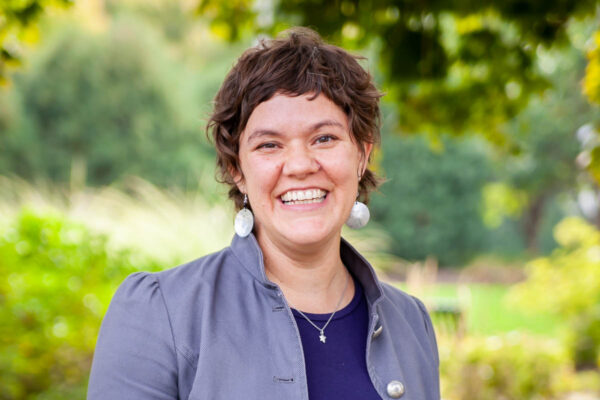Seed by seed

The abundance of rain has made the yards in my neighborhood lush and verdant. Tomatoes overflow their cages. Coneflowers burst with their bright pink in every direction. Hydrangeas have grown to be as big as bowling balls. On my daily dog walks, I’ve been delighted by the milkweed plants. They’re everywhere, intentionally planted in pollinator gardens and springing up on their own in patches of dirt in the alleys. One of my neighbors has them growing up in random spots in the grass of their yard. With patient tenderness, they mow around each one of these plants, ensuring that they can keep growing.
Milkweed isn’t a weed, nor does it produce milk. It’s a hearty native plant, with pale purple, pink, green, yellow, and orange flowers. Many pollinators love the blooms, but they are especially important because milkweed provides the only food that monarch caterpillars can eat. With the population of monarch butterflies threatened, people have planted native milkweed to create a place for butterflies to lay their eggs, and then to give food for the little caterpillars as they grow.
As I walk through my neighborhood, noticing all the milkweed, I imagine that if butterflies had their own version of online reviews, our neighborhood would be marked by so many 5-star reviews for milkweed rest-stops for food and naps. Some of those hospitable plants grew from a lucky gust of wind carrying a seed to a suitable bit of soil. But many of them were tended to by people who chose to act for the well-being of those vibrant orange and black butterflies.
These neighbors of mine remind me of that parable Jesus shared about how the kingdom of heaven is like a mustard seed. It’s the smallest of seeds which grows to be the largest of shrubs, becoming home to birds and other creatures. A mustard seed becomes a place of great hospitality, compassion, and safety. Just like milkweed.
Somedays the problems of the world feel overwhelming. Not only are entire species disappearing, but human suffering persists on a scale that defies comprehension. Yet, Jesus reminds us that our small mustard seed actions matter, not just for their own goodness, but because we trust that, by God’s grace, they might just grow into something enormous.
My neighbors seem to have caught onto this. They plant seeds and carefully ensure that the milkweed grows, the seeds are safe, food is there for the caterpillars, and the butterflies can one day emerge. We can also plant metaphorical seeds in our actions of advocacy and mercy, care and compassion. Then we trust that God, the Great Gardener, will make those small acts of goodness grow into abundant flourishing for our neighbors, butterfly and human alike.
-Sara Olson-Smith, associate pastor




Sue Grove
Sara, the teacher of the first grade class where I volunteer gets several chrysalises every fall so her students can watch the life cycle process. She needs some milkweed so she watches her neighborhood to find some. I noticed there is some by our St Paul’s neighbor, Madison School, and by our neighbor Mark Twain School. I love that kids learn how much we need that weed so we can enjoy those beautiful butterflies.
Joan Bruce
So beautifully written. I am encouraged to look for the many ways in which I can plant many types of seeds in this very overwhelming and sometimes discouraging world. In God we trust.
Julie Pearson
Thank you for this beautiful and inspiring message, Pastor Sara! I love the way you show the hospitality of the milkweed and the kindness people do by planting them.
Judy Robinson
Beautifully written and inspiring! Thank you!
Irene Hanssen
God knew exactly what He was doing when He created the milk weed. As humans we need to respect and obey what God has done for us.
Deborah Lamp
What a great message, Thank you Sara you have a good voice!